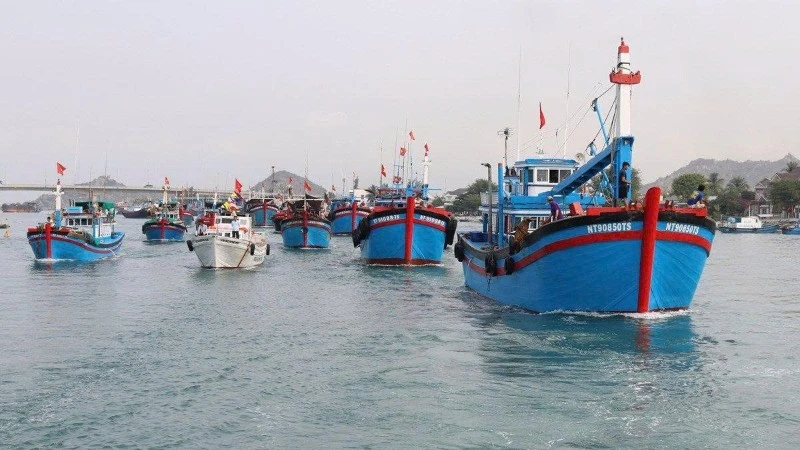The US Department of Commerce recently informed Viet Nam’s Ministry of Agriculture and Environment that it would not grant equivalency recognition for 12 of Viet Nam’s marine fishing sectors under the US Marine Mammal Protection Act (MMPA).
As a result, seafood species caught by these sectors will be banned from import into the US beginning January 1, 2026. The affected species include grouper, lobster, and mackerel caught using gillnets and purse seines; bigeye, skipjack, and yellowfin tuna (caught with midwater gillnets and surface purse seines); and swordfish and marlin (caught using midwater gillnets, handlines, and rod-and-reel gear).
According to Le Tran Nguyen Hung, Deputy Director General of the Department of Fisheries and Fishery Surveillance (under the Ministry of Agriculture and Environment), the agency responsible for enforcing the MMPA is the US National Oceanic and Atmospheric Administration (NOAA). The MMPA regulations aim to ensure that imported seafood does not originate from fisheries that cause excessive harm to dolphins, whales, and other marine mammals considered globally endangered by the US.
Viet Nam is among 34 countries granted “partial equivalency”, with 11 fisheries recognised as equivalent and 12 classified as non-equivalent. Meanwhile, 89 countries and territories have received full equivalency recognition. This partial status poses significant risks to Viet Nam’s seafood exports, especially to the crucial US market.
According to Nguyen Hoai Nam, Secretary-General of the Viet Nam Association of Seafood Exporters and Producers (VASEP), the US decision could lead to a reduction of around 500 million USD per year in Viet Nam’s seafood export value to the US. It will also directly affect the livelihoods of fishermen, the operations of processing and exporting enterprises, and the global reputation of Vietnamese seafood.
Exporting enterprises now face the risk of losing access to the US market, as most seafood species exported there are sourced from the 12 non-equivalent fishing sectors. Tuna, which is one of Viet Nam’s key export products, is particularly vulnerable. Of Viet Nam’s USD 1 billion tuna export turnover in 2024, nearly 400 million USD came from the US market.
To overcome the stringent technical barriers in the US market and secure full equivalency recognition from the NOAA, Viet Nam’s seafood industry faces an urgent need to reform its fishing practices, upgrade monitoring systems, and align technical standards with the MMPA.
According to the Ministry of Agriculture and Environment, a series of synchronised measures must be implemented in the near term — including the conversion and modernisation of fishing gear, adoption of AI-based positioning and camera monitoring systems, and public disclosure of transparent fishing data. Viet Nam is also expected to introduce specific regulations on marine mammal protection, incorporate conservation criteria into the Law on Fisheries, and tighten enforcement against illegal, unreported, and unregulated (IUU) fishing.
Nguyen Hoai Nam, Secretary-General of the VASEP, said the association has proposed that relevant ministries and agencies engage US experts and consulting firms to assist in addressing technical challenges and enhancing Viet Nam’s chances of achieving full MMPA equivalency. VASEP also recommended forming an inter-agency task force to conduct a comprehensive review of all fisheries records and develop an integrated response plan.
In parallel, VASEP urged seafood enterprises to proactively demonstrate traceability, strive to obtain international certifications such as MSC (Marine Stewardship Council) and Dolphin Safe certifications for sustainable fishing, while preparing contingency plans to adjust production and diversify export markets.
To avoid major disruptions in bilateral trade and protect fishermen’s livelihoods, Minister of Industry and Trade Nguyen Hong Dien recently sent an official letter to US Secretary of Commerce Howard Lutnick, requesting the DOC and NOAA to reconsider their decision denying equivalency for 12 Vietnamese fishing sectors. In his letter, Minister Dien emphasised that such reconsideration would not only benefit Vietnamese businesses and fishermen but also serve the interests of US importers, workers, and consumers.
The Comprehensive Strategic Partnership between Viet Nam and the US is built on mutual trust and shared benefits. Viet Nam views the US as a vital trading partner and remains committed to constructive, forward-looking cooperation to address existing challenges. The Vietnamese fisheries sector now has only about three months to complete and submit additional documentation to the US before the import ban takes effect.
Removing the 12 fishing sectors from the non-equivalency list is not merely a technical issue — it represents a strategic test of trade credibility and industry reputation. Without decisive preparation, Viet Nam risks losing a major export market and undermining its long-term path toward sustainable fisheries development.
















